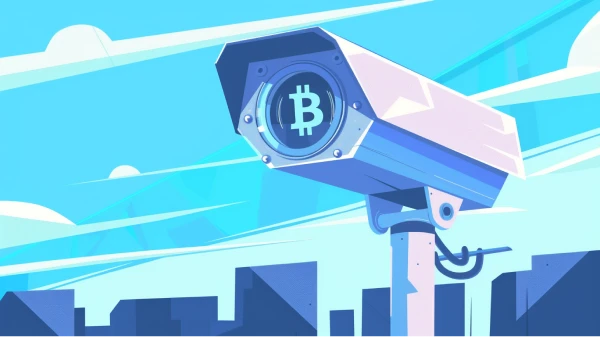Can Bitcoin Be Seized?
Bitcoin seizure is the process by which the government attempts to legally dispossesses a citizen of bitcoin. However, bitcoin is a uniquely seizure-resistant type of property. There is no amount of physical force or legal coercion that can transfer bitcoin from one party to another without the corresponding private keys. However, if authorities can ascertain the real-world identity of an individual and their bitcoin addresses, they can coerce that individual to divulge the private keys required to move the bitcoin. Bitcoin may be seizure-resistant, but humans are still vulnerable to physical threats, blackmail, and other forms of coercion.
➤ Learn more about Bitcoin addresses.
What Is Bitcoin Seizure?
Bitcoin seizure occurs when a law enforcement agency obtains the bitcoin address and private key of an individual or entity which violated the law. Sometimes the agency will target the exchange which hosts the wallet in question to seize a private key. Other times, the agency will attempt to seize the bitcoin by hacking the defendant’s hot wallet and procuring the private keys, or dispossessing the owner of a cold wallet. These warrants are typically sealed, unlike warrants seizing an address, which also disclose the full history of transactions involving the address in question to demonstrate probable cause.
Each U.S. Attorney’s Office establishes procedures that govern asset seizure for virtual currency. Prior to the commencement of a legal action or the actual seizure of assets, the Attorney’s Office collaborates with the U.S. Marshals Service to determine the quantity and valuation of the bitcoin that will be seized. To obtain a seizure warrant, the prosecuting agency must file an application and affidavit which purport in sufficient detail the factual allegations and probable cause for the seizure.
Generally, the prosecuting agency is concerned with the logistics of the seizure and possibility for forfeiture, management or disposition issues, and whether the asset is valuable enough to warrant a seizure at that time. Multiple agencies will collaborate in planning a prosecutorial strategy, but only the U.S. Marshals Service can auction off bitcoin that has been seized by another U.S. government agency. Seizure proceedings must be based on a law enforcement agent’s finding of probable cause that the asset represents the proceeds of, or was used to facilitate, criminal activity.
➤ Learn more about the Department of Justice's Asset Forfeiture Policy Manual.
How Is Bitcoin Seized?
Bitcoin is seized by law enforcement as a result of a criminal allegation. Each seizing agency preemptively creates a wallet to temporarily hold the seized bitcoin before custody is eventually transferred to the U.S. Marshals Service for auction. It remains unclear whether the FBI must obtain a warrant in order to possess the private key because those warrants are sealed. Nondisclosure of the warrant’s existence makes it more difficult to know exactly how the FBI obtained the private key. However, warrants and affidavits for the seizure of bitcoin stored at a specific address are typically available to the public.
Technical Seizure
Technical seizure occurs when the law enforcement agency seizes the bitcoin through a warrant. Bitcoin held in self-custody can also be seized pursuant to a seizure warrant, which must quantify the amount of bitcoin held and the identity of the address owner. The search warrant for bitcoin that is set to be seized from an exchange or other institutional custodian will be addressed to the exchange, not the individual.
A properly filed seizure warrant clearly identifies the address associated with the bitcoin to be seized, and must present facts that satisfy probable cause under the Fourth Amendment. Furthermore, an exchange or other institutional wallet custodian may provide the bitcoin private key identified in the seizure warrant to a prosecuting agency in an effort to absolve itself from liability.
Criminal Forfeiture
A warrant is not the only way for a law enforcement agency to seize bitcoin held by another individual or entity. Bitcoin can also be taken by the government through a process called forfeiture. Forfeiture is the permanent loss of that bitcoin by way of court order or judgment. Seizure may occur before forfeiture and not all seizures will result in forfeiture.
In a criminal forfeiture action, the defendant stands accused of criminal activity that involved a certain piece of property or a specific asset. Bitcoin is not entirely fungible and the law treats bitcoin as property, so it is subject to forfeiture in addition to seizure. Most often, defendants in a forfeiture action are already in custody and disclose the private key as part of a plea deal.
Prosecuting criminal forfeiture actions is a common way for the Department of Justice to acquire bitcoin through its agencies and officers, because criminal defendants frequently accept plea deals. In that scenario, a warrant may not be necessary if the defendant willingly relinquishes the private key in exchange for a plea bargain.
Why Is Bitcoin Seized?
Seizure occurs incident to an arrest, pursuant to a search warrant, or pursuant to a seizure warrant, which clearly defines the specific property to be seized.
Bitcoin Used To Facilitate The Commission Of A Crime
Bitcoin that is used to facilitate a crime can be seized by a warrant. Facilitation is any act or conduct which causes the crime to become harder to detect, or any instrument wielded by the individual that enabled the crime to occur. For example, consider a company which engages in money services business activities using bitcoin. Operating without the appropriate licensure could result in a criminal money laundering or conspiracy to launder charge. Assets used to facilitate a criminal act could have been lawfully obtained, but they are still subject to seizure if the asset was used in or enabled the commission of the crime.
Bitcoin Proceeds From Criminal Activity or Service
Proceeds from a crime are acquired by the criminal as compensation for engaging in the crime. For example, accepting bitcoin as payment for the sale of narcotics, computer hacking, or an assassination attempt, would render that bitcoin “proceeds of a crime” and thus able to be seized by a government agency.
➤ Learn more about an affidavit supporting a seizure warrant for bitcoin.
Notice: River does not provide investment, financial, tax, or legal advice. The information provided is general and illustrative in nature and therefore is not intended to provide, and should not be relied on for, tax advice. We encourage you to consult the appropriate tax professional to understand your personal tax circumstances.Key Takeaways
- Bitcoin seizure is the process by which the government legally dispossesses a citizen of bitcoin.
- Bitcoin is seizure-resistant and can only be seized by obtaining the private key to a bitcoin address.
- Assuming probable cause, bitcoin which funds or facilitates criminal activity will be subject to government seizure.
- Bitcoin seizure warrants are often sealed, or hidden from the public, to protect the identity of the custodian who hosted the defendant's wallet.


